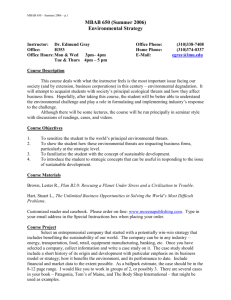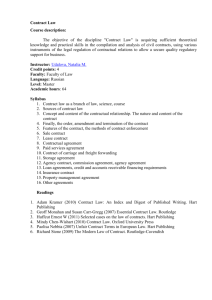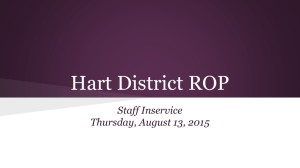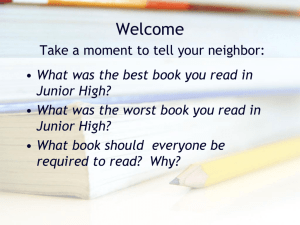Writing Literary Journalism AMST 30176, JED 30103 Monday
advertisement
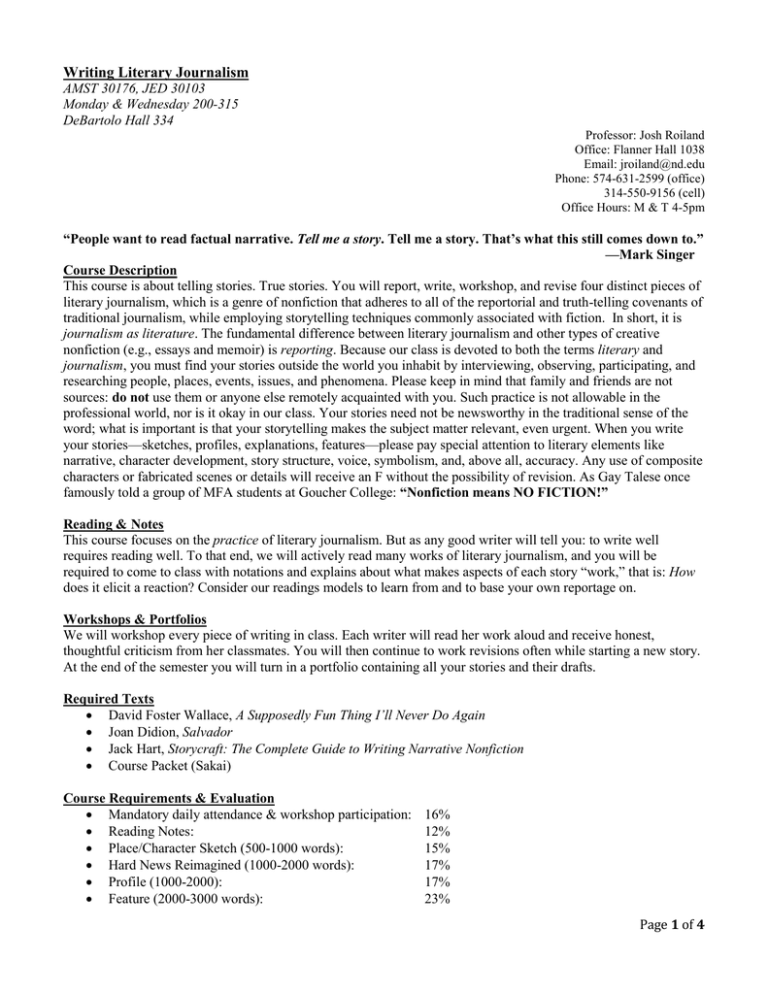
Writing Literary Journalism AMST 30176, JED 30103 Monday & Wednesday 200-315 DeBartolo Hall 334 Professor: Josh Roiland Office: Flanner Hall 1038 Email: jroiland@nd.edu Phone: 574-631-2599 (office) 314-550-9156 (cell) Office Hours: M & T 4-5pm “People want to read factual narrative. Tell me a story. Tell me a story. That’s what this still comes down to.” —Mark Singer Course Description This course is about telling stories. True stories. You will report, write, workshop, and revise four distinct pieces of literary journalism, which is a genre of nonfiction that adheres to all of the reportorial and truth-telling covenants of traditional journalism, while employing storytelling techniques commonly associated with fiction. In short, it is journalism as literature. The fundamental difference between literary journalism and other types of creative nonfiction (e.g., essays and memoir) is reporting. Because our class is devoted to both the terms literary and journalism, you must find your stories outside the world you inhabit by interviewing, observing, participating, and researching people, places, events, issues, and phenomena. Please keep in mind that family and friends are not sources: do not use them or anyone else remotely acquainted with you. Such practice is not allowable in the professional world, nor is it okay in our class. Your stories need not be newsworthy in the traditional sense of the word; what is important is that your storytelling makes the subject matter relevant, even urgent. When you write your stories—sketches, profiles, explanations, features—please pay special attention to literary elements like narrative, character development, story structure, voice, symbolism, and, above all, accuracy. Any use of composite characters or fabricated scenes or details will receive an F without the possibility of revision. As Gay Talese once famously told a group of MFA students at Goucher College: “Nonfiction means NO FICTION!” Reading & Notes This course focuses on the practice of literary journalism. But as any good writer will tell you: to write well requires reading well. To that end, we will actively read many works of literary journalism, and you will be required to come to class with notations and explains about what makes aspects of each story “work,” that is: How does it elicit a reaction? Consider our readings models to learn from and to base your own reportage on. Workshops & Portfolios We will workshop every piece of writing in class. Each writer will read her work aloud and receive honest, thoughtful criticism from her classmates. You will then continue to work revisions often while starting a new story. At the end of the semester you will turn in a portfolio containing all your stories and their drafts. Required Texts David Foster Wallace, A Supposedly Fun Thing I’ll Never Do Again Joan Didion, Salvador Jack Hart, Storycraft: The Complete Guide to Writing Narrative Nonfiction Course Packet (Sakai) Course Requirements & Evaluation Mandatory daily attendance & workshop participation: Reading Notes: Place/Character Sketch (500-1000 words): Hard News Reimagined (1000-2000 words): Profile (1000-2000): Feature (2000-3000 words): 16% 12% 15% 17% 17% 23% Page 1 of 4 Class Policies Attendance: As a creative writing workshop, our class will rely exclusively on classroom discussion and peer review. For this format to work successfully, everyone needs to attend class and actively participate. If you decide not to come to class or if you come to class unprepared your grade will severely reflect the consequences of your actions. Beginning with your third absence, your final grade will drop 1/3 (e.g. B- to C+). Students who accumulate five or more absences will automatically fail the course. Should you be late or absent, please have the courtesy to call and let me know ahead of time. You will be responsible for any notes and/or assignments you miss. Missing class is no excuse for not being prepared for the next class. A missed conference or guided workshop counts as a missed class. Cell Phones / Laptops: Please refrain from using cell phones and laptops in class. Assignments: All assignments are due in class on the day stated in the syllabus. Any work that is handed in late will receive a full grade deduction (e.g. from a B to a C) for each day that it is past due. In addition, I will not comment on work that is submitted late, nor will I always be able to return them promptly. No work will be accepted beyond the last day of class. Academic Honesty: This class follows the binding Code of Honor at Notre Dame. The graded work you do in this class must be your own. In the case where you collaborate with other students make sure to fairly attribute their contribution to your project. The purpose of research and citations is to join into an ongoing scholarly conversation about a given topic. Too often, however, research and citations carry a negative connotation: If you don’t cite, you fail!!! And while it is important to make sure we are all honest in our scholastic endeavors, we should do so for positive, rather than negative reasons. Please use sources and cite liberally, and do it because you want to situate your argument in its context and history. Unfortunately, sometimes people do not cite their sources for one reason or another, and when that is the case, there has to be consequences. Any student who plagiarizes any assignment will be subject to punishment as detailed in the Notre Dame Code of Academic Honor. To be safe, simply cite the source if you reference or even allude to material from somewhere else. Special Needs: Any student who feels that he or she may have circumstances that require special attention from the instructor should feel free to contact me in order to make the learning environment as comfortable and conducive as possible. Subject-to-Change Clause: This syllabus will assuredly change. Guaranteed. However, such changes will be announced in class, and a revised schedule will be distributed if necessary. That said: It is the student’s responsibility to be aware of changes in policies or schedules. Page 2 of 4 Reading and Writing Schedule (Everything but Wallace + Didion is on Sakai) WEEK 1: 8-26: No Class 8-28: Course Introduction WEEK 2: 9-2: John Jeremiah Sullivan, “Upon this Rock” Tom Connery, “Discovering a Literary Form” 9-4: Jo Ann Beard, “Werner” George Saunders, “The New Mecca” Mark Kramer, “Breakable Rules for Literary Journalists” WEEK 3: 9-9: Gay Talese, “New York is a City of Things Unnoticed” Gay Talese, “New York is a City of the Anonymous” Gay Talese, “New York is a City of the Forgotten” Jack Hart, Storycraft, Ch.10 “Reporting” 9-11: Jimmy Breslin, “It’s an Honor” Joan Didion, “Marrying Absurd” Jack Hart, Storycraft, Ch.1 “Story” WEEK 4: 9-16: Jimmy Cannon, “Lethal Lightning” Chris Jones, “The Things That Carried Him” Jack Hart, Storycraft, Ch.6 “Scene” 9-18: Susan Orlean, “Orchid Fever” Michael Winerip, “Holiday Pageant: The Importance of Being Bluebell” Jack Hart, Storycraft, Ch.5 “Character” 9-22: Character/Place Sketch DUE via email by 5pm WEEK 5: 9-23: Writing Workshop 9-25: Writing Workshop WEEK 6: 9-30: John McPhee, “Travels in Georgia” Jane Kramer, “The Last Cowboy” Jack Hart, Storycraft, Ch.2 “Structure” 10-2: Chris Jones, “Animals” Tom Junod, “The Loved Ones” Jack Hart, Storycraft, Ch.7 “Action” WEEK 7: 10-7: Jeff Sharlet, “Jesus Killed Muhammed” Janet Reitman, “Jahar’s World” Jack Hart, Storycraft, Ch.12 “Explanatory Narratives” 10-9: Gene Weingarten, “Fatal Distraction” Jack Hart, Storycraft, Ch.3 “Point of View” 10-13: Hard News Reimagined DUE via email by 5pm Page 3 of 4 WEEK 8: 10-14: Writing Workshop 10-16: Writing Workshop WEEK 9: 10-21: No Class—FALL BREAK 10-23: No Class—FALL BREAK WEEK 10: 10-28: David Foster Wallace, “David Lynch Keeps His Head” David Foster Wallace, “Tennis Player Michael Joyce…” David Foster Wallace, “A Supposedly Fun Thing I’ll Never Do Again” David Foster Wallace, “Getting Away From Already Being Pretty Much Away From It All” Jack Hart, Storycraft, Ch.4 “Voice and Style” 10-30: Joe Mitchell, “Professor Seagull” Charles Pierce, “The Man. Amen.” Jack Hart, Storycraft, Ch.8 “Dialogue” WEEK 11: 11-4: David Grann, “Trial By Fire” Jack Hart, Storycraft, Ch.14 “Ethics” 11-6: Pamela Colloff, “Innocence Lost” Pamela Colloff, “Innocence Found” WEEK 12: 11-11: Writing Workshop 11-13: Writing Workshop WEEK 13: 11-18: Gene Weingarten, “The Peekaboo Paradox” Robert Kurson, “My Favorite Teacher” Paige Williams, “Finding Dolly Freed” 11-20: Michael Paterniti, “The Suicide Catcher” Katharine Boo, “The Swamp Nurse” WEEK 14: 11-25: Joan Didion, Salvador Jack Hart, Storycraft, Ch.9 “Theme” 11-27: No Class—Thanksgiving Break WEEK 15: 12-2: Jay Caspain Kang, “Should Reddit Be Blamed for the Spreading of a Smear” John Jeremiah Sullivan, “You Blow My Mind. Hey, Mickey!” Darcy Frey, “Something’s Got to Give” 12-4: Writing Workshop WEEK 16: 12-9: Writing Workshop 12-11: Last Class Page 4 of 4
